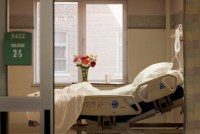Latest KFF Health News Stories
Genetics Studies Have a Diversity Problem That Researchers Struggle To Fix
Researchers in Charleston, South Carolina, are trying to build a DNA database of 100,000 people to better understand how genetics affects health risks. But they’re struggling to recruit enough Black participants.
Becerra Joins the Fray Over Reproductive Rights
Health and Human Services Secretary Xavier Becerra is racking up frequent-flier miles as he hopscotches the country to highlight health issues the White House hopes will become pivotal for voters this year — none more so than reproductive rights. “No woman today should fear [not having] access to the care that she needs. President Biden […]
City-Country Mortality Gap Widens Amid Persistent Holes in Rural Health Care Access
People in their prime working years living in rural America are 43% more likely to die of natural causes, like diseases, than their urban counterparts, a disparity that grew rapidly in recent decades, according to a new federal report.
Ten Doctors on FDA Panel Reviewing Abbott Heart Device Had Financial Ties With Company
Most of the doctors the FDA tapped to advise it on an Abbott medical device had financial ties to the company. The FDA didn’t disclose the payments.
La deuda médica afecta a gran parte de EE.UU., pero en especial a inmigrantes en Colorado
Las luchas del área reflejan una paradoja sobre Colorado. En general, la carga de deuda médica del estado es más baja que la de la mayoría. Pero las disparidades raciales y étnicas son más amplias.
Medical Debt Affects Much of America, but Colorado Immigrants Are Hit Especially Hard
Colorado is ahead of the curve on policies to prevent medical debt, but the gap between the debt load in places inhabited primarily by people of color versus non-Hispanic white residents is greater than the national average.
Históricamente, las enfermedades vinculadas al abuso del alcohol han afectado más a los hombres. Pero datos actuales de los Centros para el Control y Prevención de Enfermedades (CDC) muestran que las tasas de muerte por esta causa están aumentando más rápido entre las mujeres que entre los hombres.
More Women Are Drinking Themselves Sick. The Biden Administration Is Concerned.
Historically, alcohol use disorder has disproportionately affected men. But targeted advertising and changes in societal norms over the past 50 years have led to an upsurge in alcohol-related diseases and deaths among women. “It’s a very taboo topic,” one expert said.
Telehealth Sites Promise Cure for ‘Male Menopause’ Despite FDA Ban on Off-Label Ads
Most healthy men produce sufficient testosterone as they age. Yet online ads and telehealth sites are promoting testosterone drugs with flawed promises of boosting libido and busting stomach fat.
GOP-Led States Expand Crackdowns on Transgender Care
South Carolina’s legislature is poised to pass a bill prohibiting doctors from offering some health-care services to transgender minors — part of a new wave of anti-trans legislation from Republican-led states. The South Carolina bill, which passed the state House of Representatives in January and is under consideration in the Senate, would bar health-care providers […]
Lawsuits Claim South Carolina Kids Underwent Unnecessary Genital Exams During Abuse Investigations
Lawsuits allege that several children under 18 in South Carolina have undergone examinations of their private parts during child abuse investigations — even when there were no allegations of sexual abuse. There’s a growing consensus in medicine that genital exams can be embarrassing, uncomfortable, and even traumatic.
Southern Lawmakers Rethink Long-Standing Opposition to Medicaid Expansion
While many Republican state lawmakers remain firmly against Medicaid expansion, some key leaders in holdout states are showing a willingness to reconsider. Public opinion, financial incentives, and widening health care needs make resistance harder.
Insurance Doesn’t Always Cover Hearing Aids for Kids
California’s governor vetoed a bill extending insurance coverage for kids with hearing loss, but most states now require it.
What Would a Nikki Haley Presidency Look Like for Health Care?
Former South Carolina Gov. Nikki Haley’s tenure in the Palmetto State — which overlapped with several tumultuous years of health care reform — and her recent comments offer clues to how her presidency might affect national health care policy.
‘They See a Cash Cow’: Corporations Could Consume $50 Billion of Opioid Settlements
As opioid settlement dollars land in government coffers, a swarm of businesses are positioning themselves to profit from the windfall. But will their potential gains come at the expense of the settlements’ intended purpose — to remediate the effects of the opioid epidemic?
Being Black and Pregnant in the Deep South Can Be a Dangerous Combination
Being Black has always been dangerous for pregnant women and infants in the South. And researchers say things are continuing to move in the wrong direction.
Candidates Clashed But Avoided Talk of Abortion at 4th GOP Primary Debate
Obamacare had its moment, but not until the faceoff’s final minutes. Front-runner Donald Trump again was not on the debate stage, leaving the other Republican presidential hopefuls to slug it out to break through and gain voters’ attention.
Desperate Families Search for Affordable Home Care
Facing a severe shortage of aides and high costs, people trying to keep aging loved ones at home often cobble together a patchwork of family and friends to help.
GOP Presidential Hopefuls Use Trump’s Covid Record to Court Vaccine Skeptics
Candidates see former President Donald Trump’s embrace of his administration’s covid-19 vaccine policies as an opportunity to gain ground. So far, their efforts haven’t found traction.
Estrategia de Trump y sus adversarios de campaña: desinformar sobre las vacunas contra covid
La dinámica resultante podría impactar más allá del ciclo electoral, y afectar la política de salud pública en los próximos años. Y afectar a otras importantes vacunas.






















